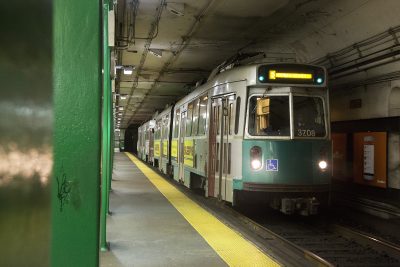
The Massachusetts Bay Transit Authority Green Line Extension Project team released a draft Request for Proposal Friday with an Affordability Limit budget of approximately $1.3 billion, according to a press release from the Massachusetts Department of Transportation.
The draft RFP outlines six “additive options” to improve the Green Line, including platform canopies and public art, which may be considered if a firm believes they can be completed within the schedule and budget, according to the release.
The MBTA Fiscal and Management Control Board and the MassDOT Board of Directors suspended the GLX Project in late 2015 because it was significantly over budget and estimated to reach $3 billion in costs, according to the GLX Project webpage.
As part of the draft RFP, the GLX Project team has proposed weekend shutdowns of the Lowell and Fitchburg commuter rail lines for 25 weekends during each year of construction, according to the release.
The MBTA filed a Notice of Project Change for the project with the Massachusetts Office of Energy and Environmental Affairs on Jan. 31. The Executive Office of the EEA issued a certificate on the MBTA’s NPC on March 10, according to the GLX Project webpage.
The certificate indicates two services branches are proposed, one 3.4 miles to Medford and one 0.9 miles to Somerville. Construction for the GLX is estimated to take place from February 2018 through December 2021.
Matthew Beaton, the secretary of the EEA and author of the certificate, reviewed the project in accordance to the Massachusetts Environmental Policy Act and received comments from Massachusetts Rep. Michael Capuano, Massachusetts Rep. Denise Provost and state agencies on the matter, according to the certificate.
Beaton wrote the certificate to bring attention to issues that MassDOT and the MBTA must address during permitting, and included recommendations that were submitted on the project change during MEPA review.
“Notably, numerous comments request that I condition approval of the NPC on a requirement that MassDOT incorporate certain mandates regarding the design and construction of the [Community Path Extension] in its design-build RFP,” Beaton wrote in the certificate.
In addition to requirements of access permits from the MassDOT and sewer connection and discharge permits from the Massachusetts Water Resources Authority, the GLX Project will need approval from the EEA, according to the certificate.
“The project was subject to review … because it will be undertaken by a State Agency and it will alter more than 50 acres of land and consists of a new rail or rapid transit line along a new, unused or abandoned right-of-way for transportation of passengers or freight,”
Beaton wrote in the certificate.
James O’Connell, a professor of city planning and urban affairs at Boston University, said although the scope of work is similar to the previous project, the more modest stations still carry out the promise of developing the GLX to Somerville and Medford.
“The city of Somerville has organized so much of its development planning around this extension,” O’Connell said. “[Somerville has] been trying to zone for development adjacent to these stations and the city was going to be very disappointed if they were ever going to cancel this project, so it’s really important that this is going forward.”
Several Boston residents expressed varying opinions about the GLX Project and the potential commuter rail shutdowns that may result.
Chelsea Hermond, 24, of Back Bay, said she would prefer the MBTA focus on extending the lines that typically have higher speeds, as opposed to the Green Line.
“Because the city is expanding outwards, I do think it would be beneficial for the MBTA to focus on some sort of expansion,” Hermond said. “But I wish it were the Red Line instead because it tends to be faster than the Green Line.”
James Conrad, 48, of Dorchester, said although he doesn’t ride the T often, he thinks the GLX will benefit younger residents of Massachusetts.
“I think that’s good because there are a lot of students living in those areas near Harvard [University] and Tufts [University],” Conrad said. “I live in the city so I don’t have the dilemma that people outside the city have when they don’t have that option to take the T from where they live.”
Corianne Oliver, 28, of Allston, said the shutdowns will not have a significant impact on commuters because there will be less of a need for those lines on the weekends.
“I used to live off the Kingston/Plymouth Line which was closed for a few years on the weekends because they were actually losing money by having it run,” Oliver said. “The commuter rail makes most of its money on weekdays anyway, hence the commuter part.”




